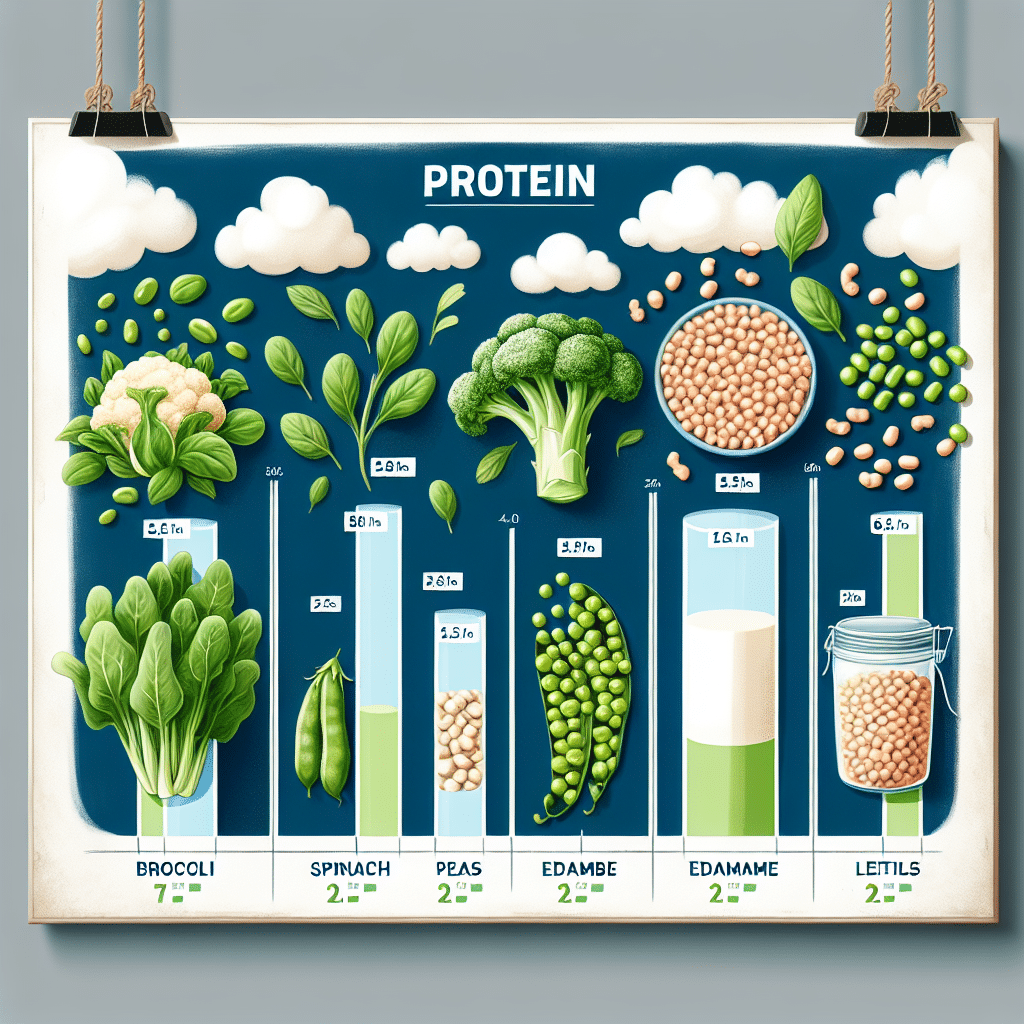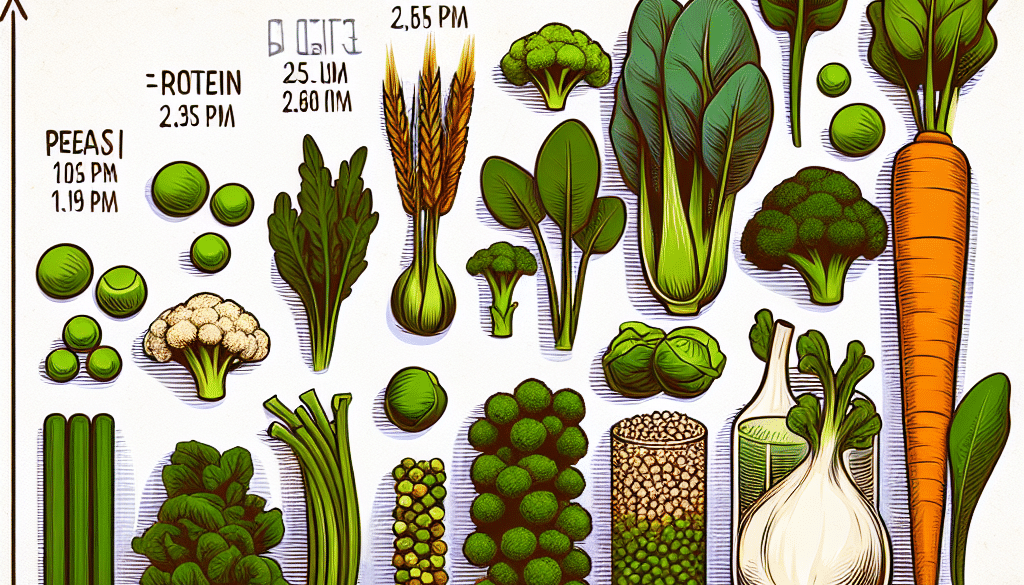What Veggies Have The Most Protein?
-
Table of Contents
- High-Protein Vegetables: Nutritional Powerhouses for Your Diet
- Understanding Protein in Vegetables
- The Top Protein-Rich Vegetables
- Integrating High-Protein Vegetables into Your Diet
- Case Studies and Statistics
- Conclusion: The Power of Protein in Vegetables
- Discover ETprotein’s High-Quality Protein Products
High-Protein Vegetables: Nutritional Powerhouses for Your Diet

When it comes to protein, most people immediately think of meat, dairy, or eggs. However, vegetables can also be a significant source of protein, especially for those following a vegetarian or vegan diet. In this article, we’ll explore the vegetables that pack the most protein punch and how they can be incorporated into a healthy diet.
Understanding Protein in Vegetables
Protein is an essential macronutrient that plays a critical role in building and repairing tissues, making enzymes and hormones, and supporting immune function. While animal products are known for their high protein content, many vegetables also contain notable amounts of this vital nutrient.
The Top Protein-Rich Vegetables
Here’s a list of vegetables that are surprisingly high in protein and should be considered in any diet:
- Edamame: These young soybeans are packed with protein, offering about 18 grams per one-cup serving.
- Lentils: Although technically a legume, lentils are often grouped with vegetables and are protein powerhouses with approximately 18 grams per cup.
- Chickpeas: Also known as garbanzo beans, chickpeas have about 15 grams of protein per cup.
- Black Beans: Another legume that’s often consumed as a vegetable, black beans provide around 15 grams of protein per cup.
- Peas: A cup of green peas contains about 9 grams of protein, making them a great addition to any meal.
- Spinach: This leafy green has about 5 grams of protein per cooked cup.
- Kale: Similar to spinach, kale offers about 3 grams of protein per cooked cup.
- Broccoli: Known for its health benefits, broccoli provides approximately 3 grams of protein per cup.
- Brussels Sprouts: These little cabbages offer about 3 grams of protein per cup.
- Mushrooms: Varieties like portobello and shiitake contain about 3-4 grams of protein per cup.
Integrating High-Protein Vegetables into Your Diet
Incorporating these protein-rich vegetables into your diet is simple and can be done in a variety of delicious ways. For example, edamame can be enjoyed as a snack, lentils can be used in soups and stews, and chickpeas are perfect for making hummus or adding to salads. Spinach and kale can be the base for a nutrient-dense salad, while broccoli and Brussels sprouts are excellent when roasted or steamed.
Case Studies and Statistics
Research has shown that incorporating plant-based proteins, like those found in vegetables, can have numerous health benefits. A study published in the American Journal of Epidemiology found that high intake of protein from plant sources was associated with lower mortality rates. Additionally, the Journal of Geriatric Cardiology reported that plant-based diets could help prevent and treat chronic diseases such as hypertension, heart disease, and type 2 diabetes.
Conclusion: The Power of Protein in Vegetables
In conclusion, vegetables can be an excellent source of protein, especially for those looking to reduce their meat consumption or follow a plant-based diet. By incorporating the vegetables listed above into your meals, you can easily increase your protein intake while also benefiting from the many other nutrients that these foods offer.
Discover ETprotein’s High-Quality Protein Products
If you’re looking to supplement your diet with additional protein, consider ETprotein’s range of organic bulk vegan proteins. Their products, including organic rice protein, pea protein, and various seed proteins, are non-GMO, allergen-free, and feature a neutral taste, making them a perfect addition to any diet.
About ETprotein:
ETprotein, a reputable protein and L-(+)-Ergothioneine (EGT) Chinese factory manufacturer and supplier, is renowned for producing, stocking, exporting, and delivering the highest quality organic bulk vegan proteins and L-(+)-Ergothioneine. They include Organic rice protein, clear rice protein, pea protein, clear pea protein, watermelon seed protein, pumpkin seed protein, sunflower seed protein, mung bean protein, peanut protein, and L-(+)-Ergothioneine EGT Pharmaceutical grade, L-(+)-Ergothioneine EGT food grade, L-(+)-Ergothioneine EGT cosmetic grade, L-(+)-Ergothioneine EGT reference grade and L-(+)-Ergothioneine EGT standard. Their offerings, characterized by a neutral taste, non-GMO, allergen-free attributes, with L-(+)-Ergothioneine purity over 98%, 99%, cater to a diverse range of industries. They serve nutraceutical, pharmaceutical, cosmeceutical, veterinary, as well as food and beverage finished product distributors, traders, and manufacturers across Europe, USA, Canada, Australia, Thailand, Japan, Korea, Brazil, and Chile, among others.
ETprotein specialization includes exporting and delivering tailor-made protein powder and finished nutritional supplements. Their extensive product range covers sectors like Food and Beverage, Sports Nutrition, Weight Management, Dietary Supplements, Health and Wellness Products, and Infant Formula, ensuring comprehensive solutions to meet all your protein needs.
As a trusted company by leading global food and beverage brands and Fortune 500 companies, ETprotein reinforces China’s reputation in the global arena. For more information or to sample their products, please contact them and email sales(at)ETprotein.com today.












